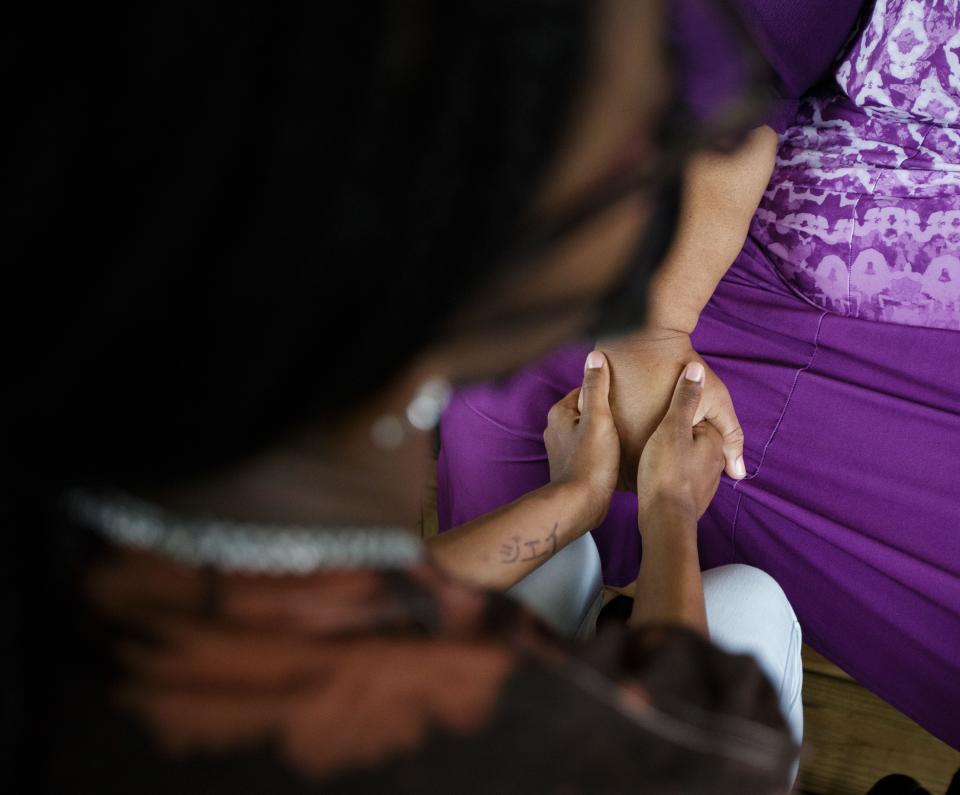COVID-19 has taken many children's parents. Their relative caregivers face host of hurdles
The COVID-19 pandemic has left tens of thousands of children without a parent or primary caregiver. Stepping into that void are grandparents, aunts, cousins – kinship caregivers – now facing their first new year as a new family unit.
Public health researchers know traumatized children often fare better when they live with a relative instead of a foster parent they don’t know. But most of these families, experts say, are “informally” taking in a child without becoming a legal guardian, adopting the child or becoming official foster parents.
That means specific benefits to help meet these children’s needs are out of reach, increasing the challenge for caregivers.
Advocates say that has to change.
“It’s an enormous issue,” said Kecia Blackson, who leads family and kinship care support services at Southwest Human Development in Arizona. “We'll see the effects of this for years to come.”
Children of color account for most of the 140,000 U.S. children who’ve lost at least one parent to COVID-19, according to a recent study from the Centers for Disease Control and Prevention. Researchers estimated about 21% of those children will need a relative caregiver.

One of the families Blackson helped was a grandmother who had been raising four children. After the 48-year-old woman died of COVID-19, the young kids were sent to another state to live with their aunt, who already has two kids. Now raising six children under one roof, the woman in her mid-20s is also mourning her mother.
“You have to have a healthy caregiver in order to support children who have also been traumatized,” Blackson said. “I don't know most people who could accommodate for additional dependents without financial assistance, and sometimes that lags behind because of all of the bureaucratic red tape that you have to go through to get the benefits changed over.”
Informal caregivers also aren’t offered the same training foster parents receive to help raise a child who is grieving or to process their own grief.

Older caregivers have unique challenges when taking in a child. Housing can be an issue if the adult is living in an assisted living facility or small apartment. Health concerns that come with age or are disproportionately represented in Black and brown people can also make childrearing difficult, Blackson and other experts said. Many "grandfamilies" or other kinship families are low-income and disproportionately of color.
A recent report by Generations United, a relative caregiver support and advocacy group, outlined several policy recommendations to benefit grandfamilies, such as increasing access to physical and mental health assistance; boosting financial, housing and child care support; improving and sustaining state kinship navigator programs; and expanding Temporary Assistance for Needy Families (TANF) funding.
Generations United estimates the average TANF grant for kids being raised by grandparents is $249 a month, compared with $511 for a foster care monthly payment.
Obtaining those TANF grants, which are one of the only financial support benefits for relative caregivers, can come with challenges, said Ana Beltran, an attorney and director of Generations United's National Technical Assistance Center on Grandfamilies and Kinship Families.
"States create hurdles. There are (TANF) application requirements that are confusing," she said. "Families can't figure out how to apply for them."
Additionally, enrolling a child in Medicaid or health insurance can be more complicated for a non-legal guardian. While children being raised by relatives qualify for Medicaid or a state children’s health insurance program, caregivers might not know about the programs and requirements.
“The systems just weren't designed to support them,” Beltran said.

Thousands of foster children live with relatives. Yet more than 108,000 of those children living with relatives or family friends did not receive a foster maintenance payment because their caregivers aren't licensed, according to Generations United.
Most states take between 90 and 120 days to license a relative caregiver, said Angelique Day, a professor at University of Washington’s School of Social Work.
“There is no uniformity across the country in licensing guidelines for relatives. States really have a lot of leeway to make their own policy,” Day said. “Some states make it easier or harder for kin to become licensed.”
For example, in Washington state, only a small percentage of kinship caregivers become licensed.
“Which makes you ask, why is it so hard for relatives to be able to get those supports?" she said. "We know that licensing relatives comes with a much more robust base of resources to support those families.”
Sylvie deToledo, a social worker and co-founder of the Alliance of Relative Caregivers in California, runs support groups to help kin caregivers and connect them to services.
"It's absolutely devastating, and there's a domino effect," she said. "The kids have the same needs as kids who are within the (foster care) system. They just aren't offered all the opportunities."
Alliance co-founder and support group facilitator Pam Meeker-Stolz said the crisis is just the tip of the iceberg.
"We're already stretched thin trying to help relative caregivers," she said. "The relative caregivers are going to be grieving the loss of their child and now trying to take in the grandchild or the relative."
Beltran said the pandemic has exposed how siloed social support systems can be, and how grandfamilies bear the brunt of that separation.
"There might be a 65-year-old grandma living in a studio apartment, and here come two grandkids, and she didn't expect this, plan for this. How is she supposed to meet their needs?" she said. "Why shouldn't we, as a society, help her when she's helping those kids and keeping them together?"
Reach Nada Hassanein at nhassanein@usatoday.com or on Twitter @nhassanein_.
This article originally appeared on USA TODAY: COVID-19 took their parents. Now kids' caregivers face many hurdles.

